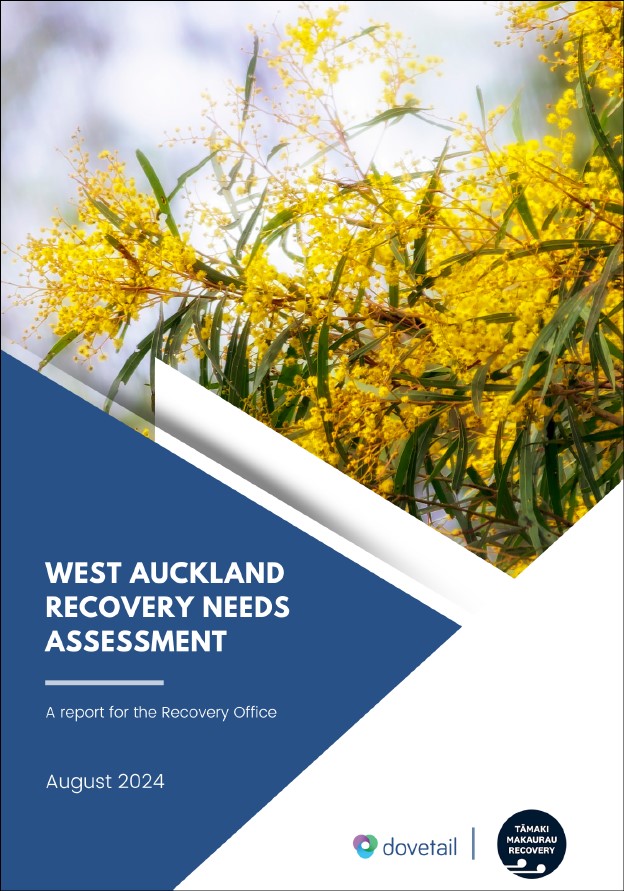West Auckland recovery needs assessment
Author:
DovetailSource:
Dovetail, Tāmaki Makaurau Recovery Office, Auckland CouncilPublication date:
2024Topics:
Environment ,PeopleExtract
Executive Summary
Two severe weather events in Tāmaki Makaurau in early 2023 caused widespread damage and displaced thousands of Aucklanders, with many facing ongoing needs stemming from one or both events. The Auckland Council-led Tāmaki Makaurau Recovery Office (‘the Recovery Office’) has undertaken a series of needs assessments to support the development of local recovery plans; this document presents findings from the West Auckland assessment. It draws on feedback from community organisations and the Recovery Office’s Storm Recovery Navigators (‘Navigators’).
Community organisations provided a wide range of services and supports in the initial response to the flooding. Since then, a spectrum of needs has remained, while others have emerged over time. In many instances, existing needs were exacerbated by the weather events, and it can be hard to ascertain the extent to which these are still linked, or not. Key recovery needs identified centred on:
- Housing and accommodation needs that stem from residents being relocated to other Auckland suburbs, a lack of appropriate housing in West Auckland, and flood-damaged homes. This has resulted in overcrowding, unsanitary and possibly harmful living conditions, increased financial costs, a loss of familial ties and cultural connections, and negative psychological impacts.
- Mental health and wellbeing needs linked to the trauma of the events, anxiety about future adverse weather events, stress and fatigue, displacement, financial stress and uncertainty, relationship tensions, and unsuitable accommodation arrangements.
- Information and support to address ongoing and emerging recovery-related needs. The categorisation process is a key area where information and support are required.
- Financial needs due to the prolonged recovery period, related to insurance issues, people having to pay rent while maintaining a mortgage, homes requiring repairs, and the replacement of material items. The ‘cost of living’ crisis adds another layer to these needs.
- Infrastructure issues linked to stormwater or drainage systems, a need to protect the health and flow of streams, and damage to roading.
- Environmental impact and community disconnection, due to deserted streets or homes, rubbish dumping on empty properties, neighbours not returning, local amenities and parks still in a state of disrepair and the loss of spaces for recreation and gathering.
- Toll on community organisations and their workers, in terms of needing to bring business as usual back on track, fatigue, and risk of burnout.
- Preparedness for the next event at individual/whānau level, as well as organisational, community and council levels.
Eighteen months on, community organisations and Navigators are still playing a range of roles in meeting recovery needs, including: connecting residents to service and support options and advocating on their behalf; providing material resources to families still struggling to recover; providing counselling and emotional support; outreach activities to help unearth lingering or new recovery needs; climate resilience activities; and preparing residents for future adverse weather events. Since the navigation service came into place in September 2023, much of this support is now provided by this team, which has taken some pressure off community organisations.
Aspects of the ongoing recovery work that are working well within the West Auckland community include strong relationships and a coordinated approach between community organisations, using effective systems for collaboration and information sharing. Outreach activities help bring people into the services, and having Partner Navigators based in the community has added another level of expertise to the community offering and a link into council. Navigators noted great team cohesion and support, strong relationships with whānau, and having the right people in the roles as key factors for success.
A range of challenges were also identified in undertaking recovery work, including: difficulties engaging the local community (e.g., due to language barriers, lack of awareness of services); the time it takes to build trust; funding coming to an end; use of technical language within systems and processes (e.g., categorisation); people losing their patience, and taking their frustration out on those who are trying to support them; and insufficient resourcing to address mental health needs. Changes within council (e.g., restructuring within Auckland Emergency Management) and everyone ‘learning on the go’ were also noted as challenges.
Longer-term concerns regarding local area risks include a lack of coordinated community (council included) preparedness for adverse weather events, the capacity of infrastructure to withstand future events, the potential negative impact of housing redevelopments and intensification, and threats to the natural environment. In sustaining recovery within West Auckland, community stakeholders identified a need for Auckland Council re-engagement, more responsive and connected systems and resourcing for much needed services (e.g., mental health), and re-building resilience within community organisations.
Dovetail, Tāmaki Makaurau Recovery Office, Auckland Council
August 2024
See also
Wellbeing recovery plan for Tāmaki Makaurau. September 2024
*****
Community and social recovery needs assessment: summary report 2024
Māngere recovery needs assessment 2023
Puketāpapa recovery needs assessment 2023
Waitākere Ranges resilience planning 2023
West Auckland emergency response study 2024
Knowledge Auckland: Other storm recovery documents
Auckland Council website:
Recovery from extreme weather and natural disasters
